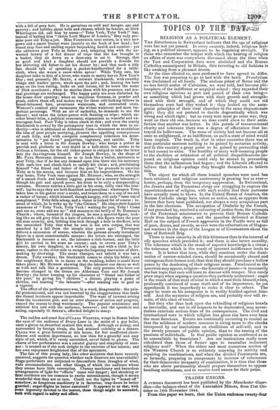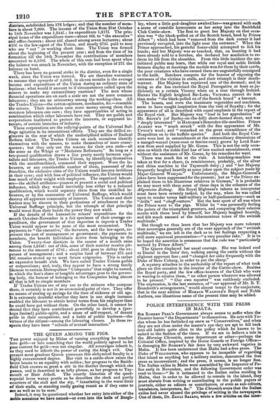TRADES UNIONS.
A CURIOUS document has been published by the Manchester Guar- dian—the balance-sheet of the Lancashire Miners, from 21st Oc- tober to 18th November 1844.
From this paper we learn, that the Union embraces twenty-four districts, subdivided into 176 lodges ; and that the number of mem- bers is about 7,000. The income of the Union from 21st October to 18th November was 1,244/.; its expenditure 1,2171. The prin- cipal items of the expenditure were—about 801. to "the executive " and office-bearers ; about 481. shared among seven lecturers ; about 4101. to the law-agent of the Union, and nearly 678/. paid to men who are " out " or working short time. The Union was formed about the beginning of the present year; and from the time of its formation till the 18th November the contributions of members amounted to 8,150/. The whole of this sum bad been spent when the balance was struck in November, with the exception of 271. the balance on hand.
There has been no general strike in the district, even for a single week, since the Union was formed. We are therefore warranted
to assume that upwards of 8,000!. in eleven months is the average
income and expenditure of the Union during an ordinary state of business: what would it amount to if circumstances called upon the miners to make any extraordinary exertion ? The men whose financial operations are on such a scale are not the mere common labourers ; they are an aristocracy among the working-class. All the Trades Unions—the cotton-spinners, mechanics, &c.—resemble the miners. Their members earn more money among them than common labourers can earn ; they have opportunities of acting in combination which other labourers have not. They are guilds and corporations instituted to protect the interests, or supposed in- terests, of certain branches of industry.
These corporations are the rallying-points of the Universal Suf- frage agitation in its intermittent efforts. They are the drilled re- giments in the rear of which the undisciplined militia of Radical Reform follow. The Trades Unions on such occasions identify themselves with the masses, to make themselves of more conse- quence ; but they only use the masses for their own ends—all the same as the Whigs or "Moderate Reformers." So long as a ten-pound qualification draws a line pretty nearly between capi- talists and labourers, the Trades Unions, by identifying themselves with the unenfranchised, command their support. Were the la- bourers, or any considerable number of them, possessed of the franchise, the exclusive aims of the Unions would become invidious in their eyes ; and with loss of political influence, the Unions would lose much of their weight with employers. The organized labour- ers—the skilled artificers—possess at present a social and political influence, which they would inevitably lose either by a reduced qualification, which would separate them from the unskilled la- bourers, or by the concession of Universal Suffrage, which would destroy all apparent community of interest. The Unions and their leaders may be sincere in their professions of attachment to the Universal Suffrage principle, but the triumph of that principle would wrest from their hands the power they now wield. If the details of the Lancashire miners' expenditure for the month October-November is a fair specimen of their average ex- penditure, the government of that imperiusn in imperio a Trades Union would appear to be none of the most economical. The payments to " the executive," the lecturers, and the law-agent, re- present the cost of management or government ; the payments to members, the benefit individuals derive from belonging to the Union. Twenty-four districts in the course of a month raise among them 1,2441: out of this, some of their number receive pit- tances to the amount of 6781.; about 538/. goes to defray the ex- penses of management ; and a surplus fund of between 27/. and 28/. remains stored up to meet future exigencies. This is rather an expensive benefit club. We have called Trades Unions guilds or corporations ; and, truly, they appear to have a strong family likeness to certain Metropolitan " Companies" that might be named, in which the lion's share of tangible advantages goes to the govern- ing body, the honour of belonging to the Companies being almost all that is left to simple members. If Trades Unions are of any use to the artisans who compose them, it certainly is not in an economical point of view. They offer no means of storing up savings for the time of sickness or old age. It is extremely doubtful whether they have in one single instance enabled the labourer to obtain better terms from his employer than be could have got without them. On the other hand, it cannot be denied that they have contributed powerfully to develop a (per- haps limited) public-spirit, and a sense of self-respect, of decent pride in their occupations, and a habit of public business—the virtues of the citizen—among the labouring classes. In these re- spects they have been "schools of mutual instruction."



























 Previous page
Previous page